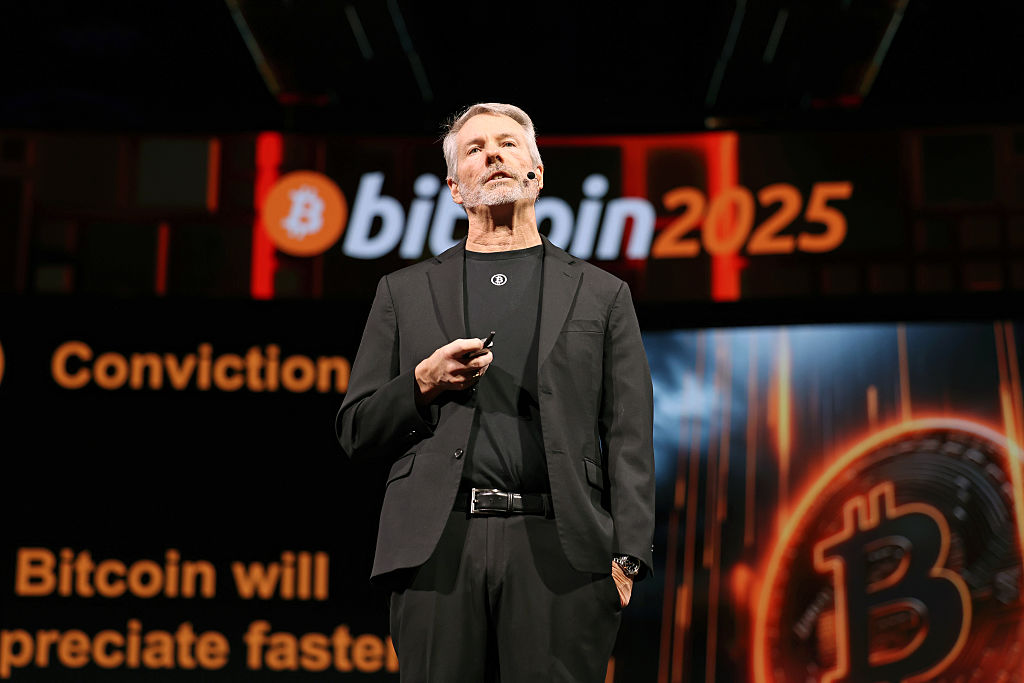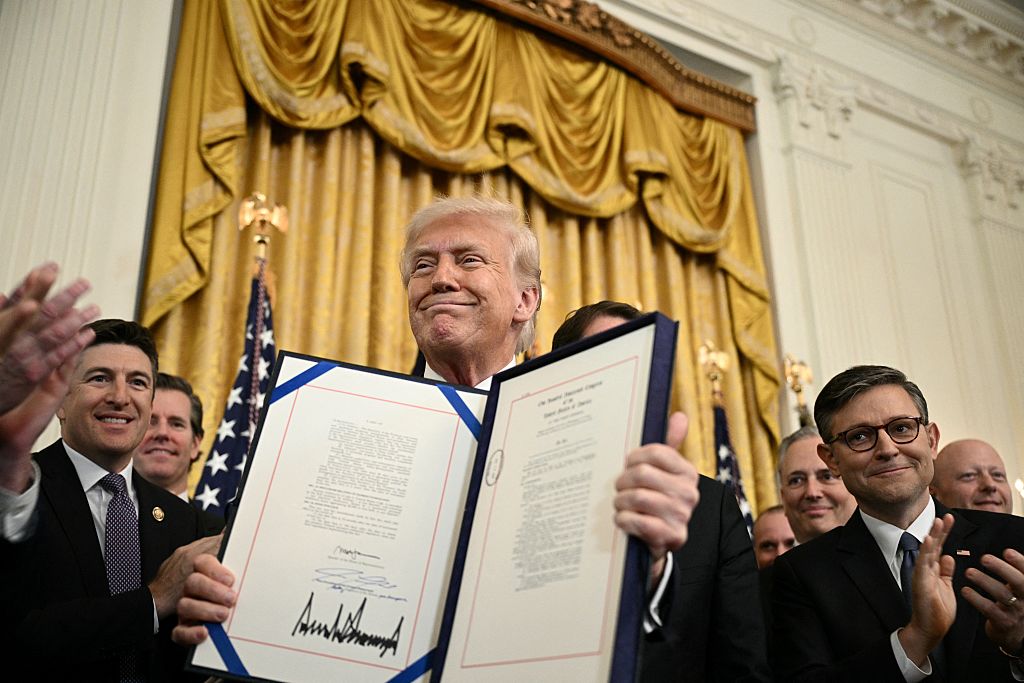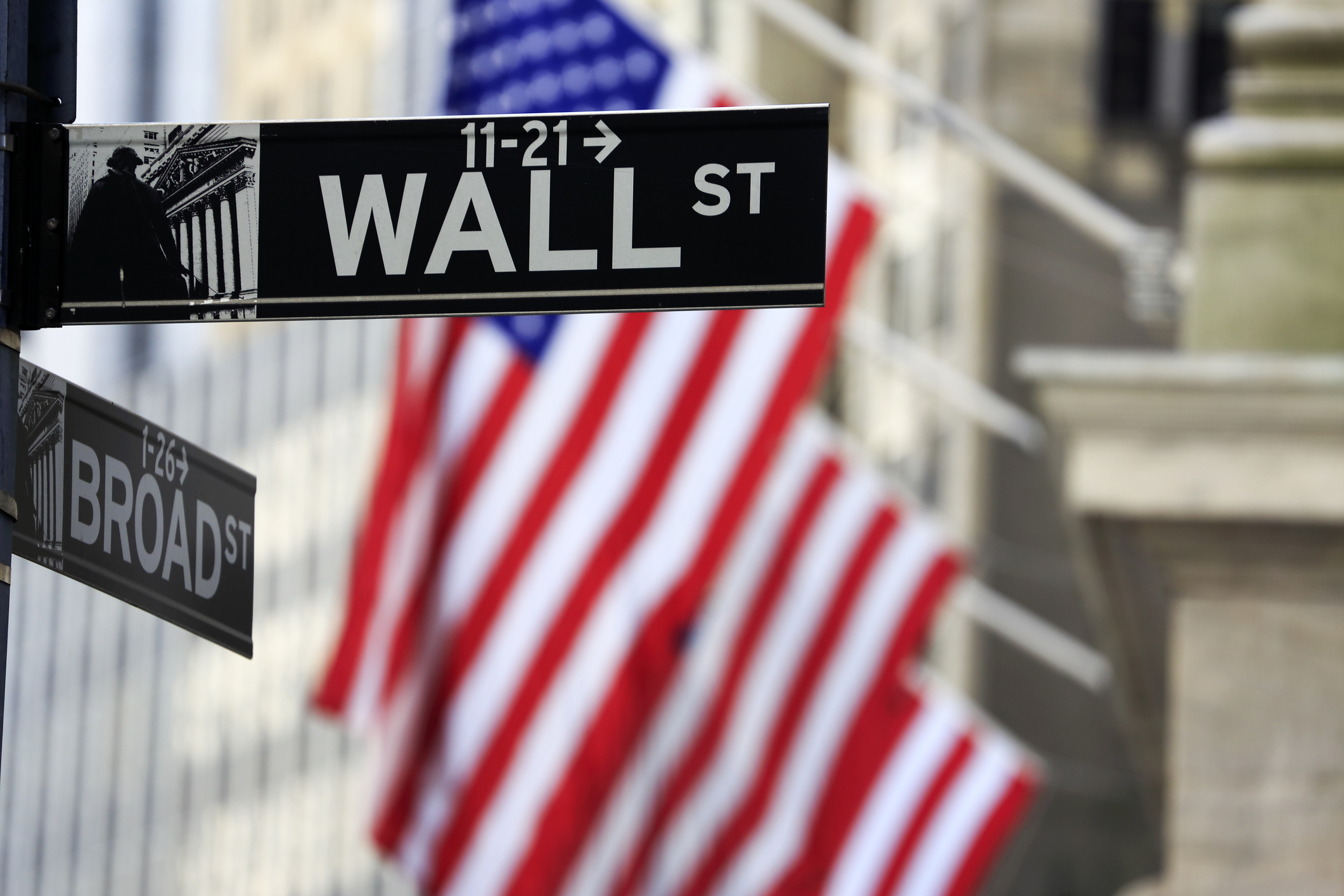The stocks spearheading the charge of cryptocurrency
Companies are starting to invest in bitcoin and other cryptocurrencies, a trend likely to hasten the mass adoption of digital money. Buy before the stampede arrives, says Dominic Frisby


Get the latest financial news, insights and expert analysis from our award-winning MoneyWeek team, to help you understand what really matters when it comes to your finances.
You are now subscribed
Your newsletter sign-up was successful
Want to add more newsletters?

Twice daily
MoneyWeek
Get the latest financial news, insights and expert analysis from our award-winning MoneyWeek team, to help you understand what really matters when it comes to your finances.

Four times a week
Look After My Bills
Sign up to our free money-saving newsletter, filled with the latest news and expert advice to help you find the best tips and deals for managing your bills. Start saving today!
The only countries that own more bitcoin than the UK are the US (with 207,000 bitcoin) and China (194,000). Britain has 61,000, worth more than $6 billion. But don’t tell Rachel Reeves. She might be tempted to sell it. History would then look back on her as an even greater fool than Gordon Brown for selling the nation’s gold. Ours are mostly seized bitcoin, a lucky legacy from the early days when the UK was at the heart of bitcoin’s evolution. The City’s regulator, the Financial Conduct Authority (FCA), in its wisdom, put a stop to all that, and so we fell behind.
This legacy has given the UK an extraordinary advantage in the global arms race that is bitcoin adoption. We would be mad to spurn it. Meanwhile, as bitcoin moves into the mainstream, something remarkable is taking place in the corporate world of bitcoin adoption, and it is accelerating rapidly. The trend is being spearheaded by Michael Saylor, chairman and founder of Strategy.
I recommended MicroStrategy, as it used to be called, when writing for MoneyWeek in 2023, largely because it was a means to secure exposure to bitcoin via your broker. You wouldn’t have to jump through all the hoops of buying bitcoin through exchanges, which the FCA has made so difficult for British investors. (The FCA began its attack on bitcoin ownership when bitcoin was at $6,000, so that’s around $100,000 of gains, a seventeen-fold increase, that UK investors have been “protected” from. Its rulings also caused the UK to go from leader to laggard in the crypto arms race.)
MoneyWeek
Subscribe to MoneyWeek today and get your first six magazine issues absolutely FREE

Sign up to Money Morning
Don't miss the latest investment and personal finances news, market analysis, plus money-saving tips with our free twice-daily newsletter
Don't miss the latest investment and personal finances news, market analysis, plus money-saving tips with our free twice-daily newsletter
Michael Saylor: Strategy's charismatic cheerleader
Strategy has been a big win for readers, having soared more than twelve-fold since I tipped it – outperforming bitcoin by a considerable margin. Strategy now has some 555,450 bitcoin, more than any other publicly traded company in the world (excluding bitcoin exchange-traded funds, or ETFs, which now hold 1.35 million). Remember, there will only ever be 21 million bitcoins (the anonymous founders of the digital currency wanted to ensure it was perceived as scarce). Saylor is also the world’s most articulate and charismatic proponent of bitcoin. The man is a genius.
He has turned Strategy from a quiet, business-intelligence software firm, which traded sideways for 20 years with a market value of less than $2 billion, into one of the most widely traded stocks in North America, worth over $100 billion. His method for doing so – extraordinarily bold at the time, though now it looks easy – was brilliantly simple. Worried about the erosion of the value of the corporate treasury owing to currency debasement and money printing during Covid, he bought bitcoin. He started slowly. Then, in buying bitcoin and using it, he caught the bitcoin bug. He started issuing paper (stock, debt, convertible notes) and bought more bitcoin.
In effect, he is creating money out of (almost) nothing and using it to buy the hardest money in the history of mankind. (Sorry, goldbugs, you know I’m on your team, but I say bitcoin is harder money, because the supply is more finite.) In doing so, he has enabled many of his investors to retire early. I think there’s a very good chance that Strategy will become a trillion-dollar company, while Saylor is likely to become the world’s richest man. But he has also set in motion something quite extraordinary. Other companies are now starting to follow his model.
To call the pre-bitcoin Strategy a zombie company is harsh, but it was not really going anywhere.
Interestingly, it is zombie or near-zombie firms with large treasuries that are most likely to follow the Saylor model. Their need for a new direction is greater.
Microsoft recently gave Saylor a mere three minutes to pitch his model to them, and duly ignored it. That’s its loss. But Microsoft is Microsoft. At present, it doesn’t need bitcoin, and it doesn’t need to take the risk. GameStop, on the other hand, is a different matter. Remember GameStop from 2021 and all those memes during lockdown? The video-game retailer had more than 3,000 outlets, and its business model was considered defunct. People buy games online now. But some private investors noted that the short position exceeded 100% of the issued shares of the company, and started buying. The ensuing short squeeze sent the stock from $17 to north of $500. GameStop closed 400 stores this year. But the company has $4.7 billion in cash, low debt, and has just raised $1.5 billion. What does it do now? Bitcoin is the answer. We don’t yet know how much it has bought.
The Japanese company Metaplanet is doing something similar. And this is an incredible story. Metaplanet had a small chain of low-budget hotels across Southeast Asia. Covid decimated the business. A year ago, seeking a new direction, CEO Simon Gerovich began copying the Saylor model and started using his cash flow to buy bitcoin. Then he began issuing debt. Since early 2024, when the firm embarked on its strategy, the stock has risen thousands of percent. Last year, it was one of the best-performing companies in the world.
Japan joins the advance
In the time that bitcoin has risen 60%, Metaplanet has risen more than 7,000%. Why? Thanks to Japan’s weak currency and suppressed bond yields, bitcoin is an obvious place for local investors to put their capital, except, as with the UK, the government has got in the way. Regulations make it very hard for Japanese investors to buy bitcoin directly.
This is due to Japan-based Mt. Gox, the first bitcoin exchange, going bust after being hacked in 2013-2014. To give you an idea of how ponderous things are, to register with a bitcoin exchange in Japan, regulators demand you get a letter by snail mail to verify your address. What’s more, when the Japanese sell, they must pay capital gains tax at 55%.
But Metaplanet is a Tokyo-listed company, so investors are buying that instead in their retirement accounts and via their brokers. Far less hassle. Metaplanet has become Japan’s bitcoin vehicle – indeed, much of Asia’s. The mother of all short squeezes seems to be taking place. It’s the most shorted stock in all of Japan, and the short-sellers couldn’t cover.
Britain’s bubble
How about this for nuts? In the UK, The Smarter Web Company (SWC), listed on the Aquis Exchange, a market for small firms, has hit a market value of £175 million. Its assets? Around £5 million in bitcoin. This bubble in SWC has been caused by state regulation and the FCA. We wouldn’t be in this situation if it was easy to buy bitcoin. It’s enough to make you a libertarian.
I know it feels as if you are late to the bitcoin story. We all wish we bought it at $10, when we first heard about it. But we didn’t. Still, this story is a long way from being over. The bitcoin treasury model is the latest evolution, and it is here to stay, because bitcoin is an infinitely better store of value than fiat money.
There are now some 70 companies employing this strategy. This will eventually become a stampede, which I urge you to front-run. Corporations have much deeper pockets than private investors, so this latest cycle in bitcoin’s mass adoption could become a mega-mania.
It’s not just GameStop. Recently, the UK’s UK Aquis-listed Coinsilium, which has been trying for years to get crypto businesses off the ground, recently raised money to follow the Treasury model. In Canada, a new vehicle, Bitcoin Treasury Corp, is raising C$125 million to list.
The problem of corporate dilution has been flipped on its head. Once, if a company issued 20% more stock, you would expect the stock to fall by a concomitant amount to reflect the dilution. But if you’re using paper to buy bitcoin, the reverse applies. You can’t dilute enough. The idea of a bitcoin treasury company is to acquire as much bitcoin as possible on behalf of all shareholders, by whatever means.
This brings us to the question of how to value bitcoin treasury companies. We have a methodology: mNAV. To calculate a company’s mNAV, you divide its market capitalisation by the value of its bitcoin treasury. The Smarter Web Company has an mNAV of 28 (a £140 million market value divided by £5 million in holdings). A higher mNAV means the company can issue new shares at a premium to its bitcoin holdings, allowing more efficient capital raising, since it acquires more bitcoin per share issued. This increases the bitcoin (BTC) yield per share. Once you have established the mNAV, you have to look at the amount of time required to cover mNAV. Can the company’s BTC yield (the amount of bitcoin it is acquiring) justify its mNAV premium?
Strategy has an mNAV of roughly two (it is valued at twice its bitcoin holdings) and its bitcoin yield in 2025 is 16%, so it will take around 19 months to cover its mNAV. The company my readers and I have gone for is Semler Scientific (Nasdaq: SMLR). Semler Scientific’s day job is to supply technology products and services to healthcare providers. Chairman Eric Semler freely admits it had become a zombie company, although it is turning a corner, he says. It has a market cap of $500 million, $100 million in debt, and 3,808 bitcoins (worth $400 million), so its mNAV is 1.2. It has a bitcoin yield of 22% year-to-date, which works out at 56% annually. It will take five months to cover its mNAV. I’m also planning to go for Gamestop (NYSE: GME) as it has a huge chance of catching the memes.
It’s not just bitcoin. Canada’s Sol Strategies is doing something similar for Solana, another cryptocurrency that has just announced a $500 million convertible note. This firm had a market cap of C$20 million a few months ago. What started as a trickle is beginning to flow. The more firms that do this, the bigger the rush will be. Companies are changing the way they store capital and the capital they store. The implications for how firms hold their treasuries are one thing. The implications for fiat money are extraordinary. Issue debt – ie, create money – and buy hard digital assets with it. This is going to be a big, big theme.
Dominic Frisby writes the investment newsletter The Flying Frisby. More at theflyingfrisby.com
This article was first published in MoneyWeek's magazine. Enjoy exclusive early access to news, opinion and analysis from our team of financial experts with a MoneyWeek subscription.
Get the latest financial news, insights and expert analysis from our award-winning MoneyWeek team, to help you understand what really matters when it comes to your finances.

-
 Should you buy an active ETF?
Should you buy an active ETF?ETFs are often mischaracterised as passive products, but they can be a convenient way to add active management to your portfolio
-
 Power up your pension before 5 April – easy ways to save before the tax year end
Power up your pension before 5 April – easy ways to save before the tax year endWith the end of the tax year looming, pension savers currently have a window to review and maximise what’s going into their retirement funds – we look at how
-
 How to add cryptocurrency to your portfolio
How to add cryptocurrency to your portfolioA new listing shows how bitcoin might add value to a portfolio if cryptocurrency keeps gaining acceptance, says Cris Sholto Heaton
-
 The steady rise of stablecoins
The steady rise of stablecoinsInnovations in cryptocurrency have created stablecoins, a new form of money. Trump is an enthusiastic supporter, but its benefits are not yet clear
-
 Who is Christopher Harborne, crypto billionaire and Reform UK’s new mega-donor?
Who is Christopher Harborne, crypto billionaire and Reform UK’s new mega-donor?Christopher Harborne came into the spotlight when it emerged he had given £9 million to Nigel Farage's Reform UK. How did he make his millions?
-
 Circle sets a new gold standard for cryptocurrencies
Circle sets a new gold standard for cryptocurrenciesCryptocurrencies have existed in a kind of financial Wild West. No longer – they are entering the mainstream, and US-listed Circle is ideally placed to benefit
-
 Key lessons from the MoneyWeek Wealth Summit 2025: focus on safety, value and growth
Key lessons from the MoneyWeek Wealth Summit 2025: focus on safety, value and growthOur annual MoneyWeek Wealth Summit featured a wide array of experts and ideas, and celebrated 25 years of MoneyWeek
-
 What MoneyWeek has learnt in the last 25 years
What MoneyWeek has learnt in the last 25 yearsFinancial markets have suffered two huge bear markets and a pandemic since MoneyWeek launched. Alex Rankine reviews key trends and lessons from a turbulent time
-
 The MoneyWeek Wealth Summit 2025: how to invest for a volatile era
The MoneyWeek Wealth Summit 2025: how to invest for a volatile eraMoneyWeek's 25th birthday conference’s agenda offers investors a wide array of compelling themes
-
 Who is Rob Granieri, the mysterious billionaire leader of Jane Street?
Who is Rob Granieri, the mysterious billionaire leader of Jane Street?Profits at Jane Street have exploded, throwing billionaire Rob Granieri into the limelight. But it’s not just the firm’s success that is prompting scrutiny